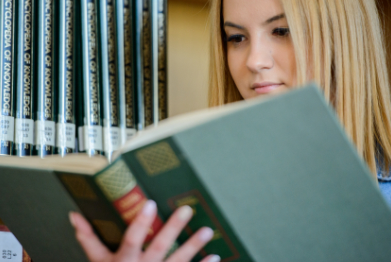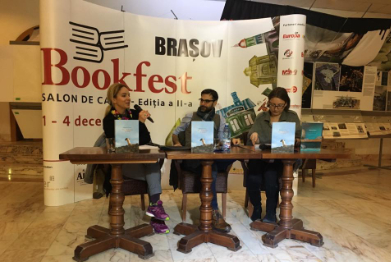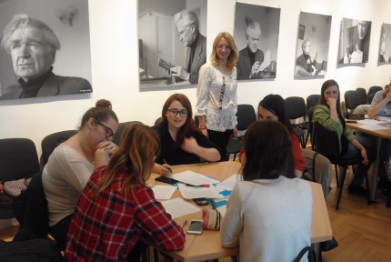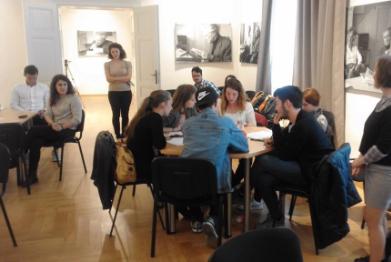Master's degree

The part-time master's degree programme Culture and Discourse in the Anglo-American World, taught in English, integrates in the master's degree field of Philology. It is addressed especially to graduates of undergraduate programmes in the same field and offers advanced professional training (120 ECTS) mainly for future teachers of English language and literature. The programme also includes an important interdisciplinary component through elective course packages, which enables graduates to access the labour market in fields other than teaching. Students benefit during their studies from a university library equipped with specialized books and modern laboratories (language studies laboratory, multimedia laboratories).
Perspectives after graduation: teacher of English language and literature; translator; book editor; research assistant in institutes of linguistic research, cultural studies or literary theory and history; specialist editor in the written or audiovisual media.

DThe master's degree field in which this study program integrates is Philology. The duration of studies is 2 years (120 ECTS credits). The curriculum of this master's programme is designed taking into account the general orientation of higher education in Romania, and capitalizes on the expertise of specialists at the Faculty of Letters, focussing on the cultural, literary and linguistic specificity of the Transylvanian space. The course and seminar activities are interactive, envisaging the formation of intercultural skills in accordance with the requirements of the globalized world, stimulating the capacity for research and teamwork and enhancing originality and individual creativity. Seminar activities and specialized practice activities are focused on the development of research skills from an intercultural and interdisciplinary perspective.
Perspectives after graduation: teacher of German language and literature in high school, cultural / literary reviewer, cultural journalist, (literary) translator, etc.

The part-time master's programme Romanian language and literature. Identity in multiculturalism is designed as an in-depth master's degree programme in Philology and is addressed especially to graduates of undergraduate programmes in this field, offering an advanced training plan for future teachers of Romanian language and literature. The programme also includes an important interdisciplinary component through elective course packages, which enable graduates’ access to the labour market in fields other than teaching. The students benefit during the study from a university library with specialized books and modern laboratories (language studies laboratory, multimedia laboratories).
Perspectives after graduation: teacher of Romanian language and literature, specialist referent, documentation teacher, research assistant in institutes of linguistic research, cultural studies or literary theory and history, coordinator of cultural programmes, book editor, specialist editor in the written or audiovisual media, civil servant, specialist consultant in national and multinational companies.

The master's field in which the programme Studies of Romanian Language and Literature integrates is Philology. The duration of the studies is 2 years (120 ECTS credits), and the curriculum is designed taking into account the general orientation of higher education in Romania and the expertise of specialists at the Faculty of Letters. The course and seminar activities do not focus on the transmission of information, but on selection and consultancy so as to have students efficiently manage the scientific information. Seminar and specialized practice activities are focused on developing research skills and solving concrete problems that graduates will face in the future profession.
Perspectives after graduation: teacher of Romanian language and literature in high school, research assistant, literary reviewer, journalist, book editor, editor in the written or audiovisual media, civil servant, specialist consultant in national and multinational companies.

Subsumed to the field of Philology, Language Studies for Intercultural Communication (in English) is a master's degree research programme conducted exclusively in English over two years (4 semesters, 120 ECTS). The disciplines in the composition of the curriculum are oriented towards the study, from a macrolinguistic perspective, of a complex of phenomena associated with communication in and between different ethnic and professional communities. What are the variables of intercultural communication situations? How can they be systematically investigated? What forms does the transfer of meanings and messages take from one linguistic community to another? These are some of the issues approached in this programme. Teaching and learning are based on heuristic methods that involve the students’ involvement in individual and team activities and projects, solving concrete communication problems, as well as creating opportunities for the implementation of discovered information. The priority is to train specialists capable of identifying cultural variations in real time and interpreting them in the spirit of cultural and linguistic relativism in order to successfully interact in different cultural contexts and communication situations.
Perspectives after graduation: teacher of English language and literature in high school, research assistant, terminologist, interpreter, translator, public administration advisor.

The master's field which this study programme belongs to is Philology. The duration of studies is 2 years (120 ECTS credits). The Cultural Innovation programme is oriented both towards humanistic research and towards the area of literary and cultural creativity. It is based on the specifics of the Faculty of Letters in Brașov, with academics who are both writers and cultural managers. These complementary competencies of experienced professors foster both the scientific area and the one related to literary and cultural creativity, in a broad sense.
The programme has a very solid practical component as it relies on the acquisition of skills “in action”. Master’s students are taught not only how to draft a cultural project, how to create or translate a text (in different genres), but also how to create and complete a product, with all the items that make it up.
Perspectives after graduation: employees in public and private institutions in the cultural field or with cultural components; creative industries; the publishing market; editorial offices of newspapers, magazines, radio, television that also cover the cultural area; non-governmental organizations, film studios, theatres; teachers for high school education, etc.

The 4-semester Master's degree in "French Language and Literature Studies" is interdisciplinary and focuses on the latest research areas in language and literature studies, as well as cultural studies in general. This programme comes as a complement to the already existing "Cultural Innovation" programme, this time with a French specificity and a new perspective on interdisciplinarity. The programme also includes subjects dealing with translation and traductology, which is an undeniable practice in any branch of the humanities, but situates literature and language within the broad frameworks of the dynamics of today's world. Therefore, the curriculum of this programme includes disciplines that provide students with skills and competences that are themselves interdisciplinary, as well as a new perspective on the stakes of language and literature studies in today's dynamic world. Disciplines related to the relationship between culture, literature and ecology offer both an opening for new research methods in literature and translation (e.g. eco-criticism and eco-translatology, or cognitive sciences) and for the civic engagements that students can assume as citizens. Also, disciplines dealing with hybrid cultural forms, in which literature is included alongside other forms of creation, provide students with a broader knowledge and give them the opportunity to articulate the skills acquired during the undergraduate programmes with other, transversal ones.
From the point of view of the expected employability, the broadening of the research areas proposed in this Master's programme should lead to an increase in employability, not only in relation to the specific environmental characteristics of the region (mountains, mountain tourism), but also in view of the wider European area in which we find ourselves. Research linking ecology, as a transdisciplinary concern and as an imperative in all fields of activity, to cultural studies, as well as disciplines focusing on the increasingly close relationship between literature, language and new media supports represent a novelty on the map of master's degrees with a French-speaking component in Romania. In this way, the graduates of this master's programme will have an advantage in employment based on the qualifications offered by this master's programme.